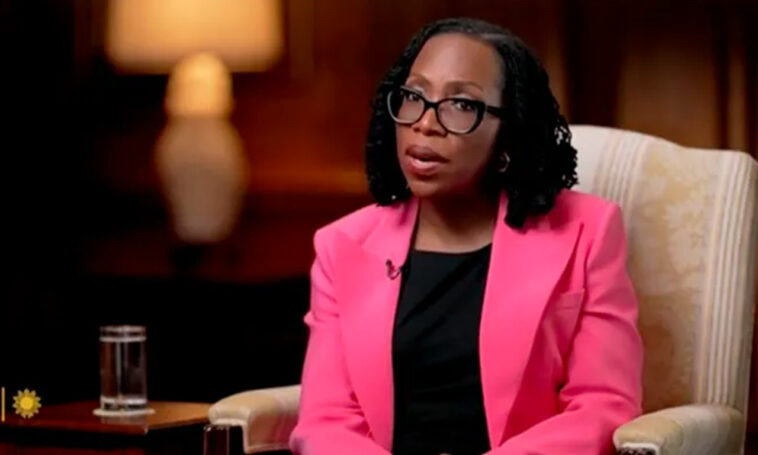Justice Ketanji Brown Jackson advocates for an enforceable ethics code for the Supreme Court, emphasizing impartiality and transparency.
Supreme Court Justice Ketanji Brown Jackson has voiced her support for an enforceable ethics code for the Supreme Court, marking her stance on a hot-button issue in judicial ethics. In her first extensive interview since joining the Court, Jackson emphasized the importance of transparency and impartiality for the highest court in the land.
In a conversation with CBS News’ Norah O’Donnell, Jackson addressed the need for clear ethical guidelines, stating, “I follow the rules, whatever they are, with respect to ethical obligations. And it’s important in my view to do so. It really boils down to impartiality. That’s what the rules are about. People are entitled to know if you’re accepting gifts as a judge, so that they can evaluate whether or not your opinions are impartial.”
“A binding code of ethics is pretty standard for judges,” Justice Ketanji Brown Jackson said.
This discussion comes amidst increased scrutiny of Supreme Court justices and their adherence to ethical standards. The Supreme Court had previously issued a new “Code of Conduct” in November 2023 following growing pressure from Democrats and public outcry over perceived ethical lapses among justices. High-profile controversies, such as Justice Clarence Thomas’s failure to disclose luxury gifts from Republican donor Harlan Crow and Justice Samuel Alito’s use of an upside-down American flag post-January 6 Capitol riot, have amplified calls for reform.
Justice Jackson was asked about her position on the specific cases involving other justices. While she refrained from commenting on individual situations, stating, “I’m not going to comment on other justices’ interpretations of the rules or what they’re doing,” she made it clear that she supports the concept of a binding ethics code. “A binding code of ethics is pretty standard for judges,” Jackson noted. “And so, I guess the question is, ‘Is the Supreme Court any different?’ And I guess I have not seen a persuasive reason as to why the court is different than the other courts.”
Jackson’s support for an enforceable code reflects a broader debate within the judicial community about the need for consistent and transparent ethical standards. While the Supreme Court’s recent code update aims to address some concerns, Jackson’s endorsement of enforceable measures suggests a desire for more robust mechanisms to ensure compliance.
In addition to her stance on judicial ethics, Jackson addressed her own financial disclosures. The justice revealed receiving four concert tickets valued at $3,700 from pop superstar Beyoncé and disclosed a $900,000 advance for her upcoming memoir “Lovely One,” set for release in September. Jackson also reported two gifts of artwork worth $12,500 in her chambers. Such disclosures are part of the transparency required from all federal judges, and Jackson’s openness about her financial dealings underscores her commitment to ethical standards.
Beyond ethics, Jackson discussed the Supreme Court’s ruling on presidential immunity. In July, the Court ruled that a former president has substantial immunity from prosecution for official acts performed while in office, but not for unofficial acts. Jackson expressed concerns about this decision, particularly regarding the uniform application of justice. “I was concerned about a system that appeared to provide immunity for one individual under one set of circumstances, when we have a criminal justice system that had ordinarily treated everyone the same,” she said. This dissenting opinion highlights Jackson’s commitment to equal justice and her critical view of how immunity is applied.
Justice Ketanji Brown Jackson’s remarks come as part of an ongoing dialogue about the ethical standards and practices of the Supreme Court. Her support for an enforceable code underscores the need for clarity and accountability in the judiciary. As the Court navigates these discussions, Jackson’s position will likely influence future debates on judicial ethics and reform.
As the Supreme Court continues to address various complex issues, including its own ethical framework, Jackson’s perspective contributes to the broader conversation about maintaining integrity and transparency within the highest court of the United States.







Join the Community and Be a Part of the Conversation
You must be logged in or registered to post a comment.